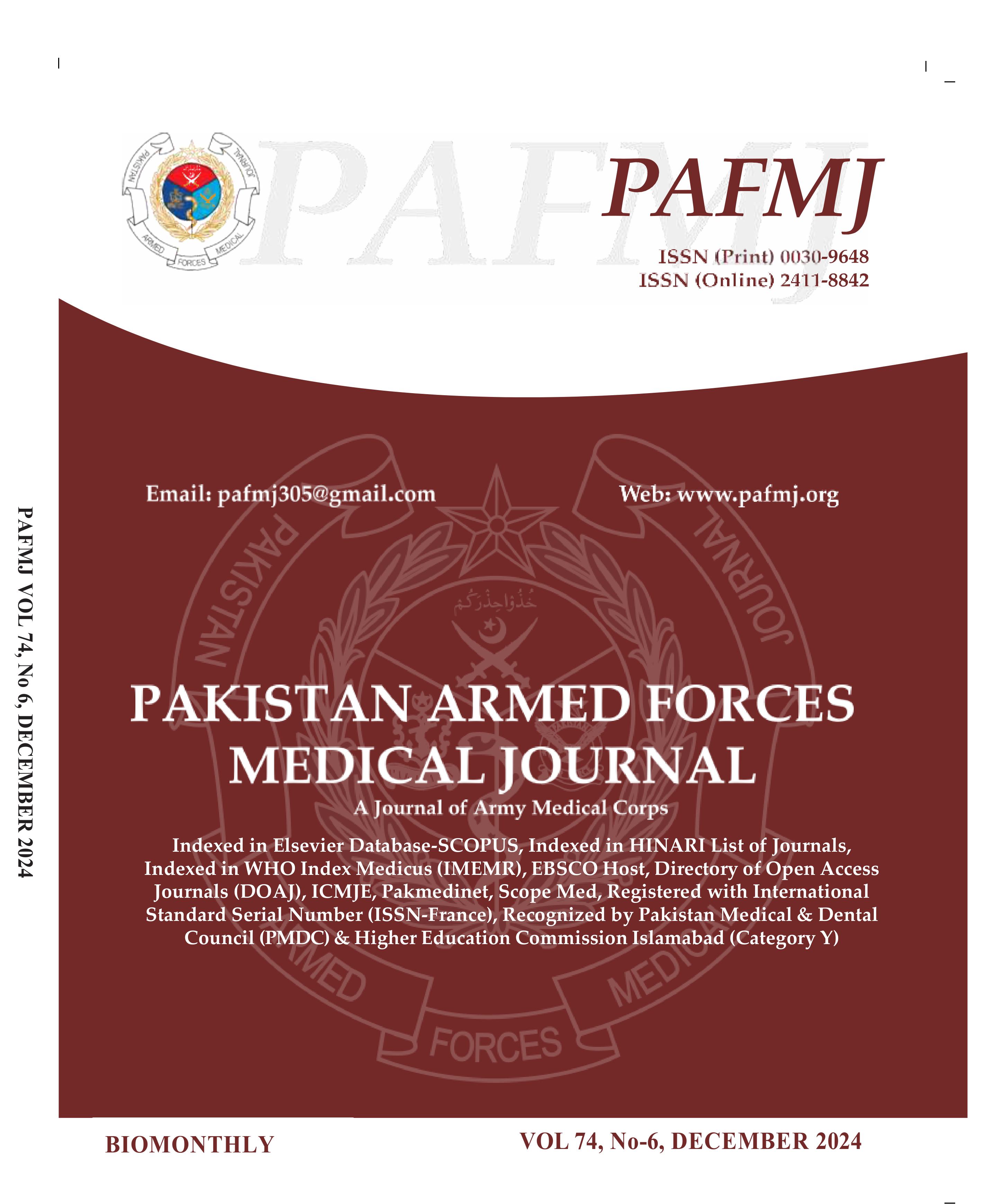Assessment of Mental Health and Mental Health Literacy Among Medical Students of HITEC-IMS
DOI:
https://doi.org/10.51253/pafmj.v74i6.12196Keywords:
Anxiety, Burnout, Depression, Gender Socialization, Mental Health, Mental Health Literacy, Social StigmaAbstract
Objectives: To Assess Mental Health and Mental Health Literacy among medical students in HITEC-IMS, evaluate their relation to sociodemographic variables, and determine the correlation between Mental Health and Mental Health Literacy.
Study Design: Cross-sectional study.
Place and Duration of Study: Department of Community Medicine, HITEC-IMS, Taxila Pakistan, from Nov 2023 to Apr 2024.
Methodology: Two hundred six participants from MBBS students of HITEC-IMS participated, using a consecutive sampling method (five groups based on year of study). The structured proforma with three parts was used, the first part started with collecting demographic variables. The second part consisted of the pre-validated Mental Health Literacy Scale for assessing Mental Health Literacy, and the third part included the Warwick-Edinburgh Mental Well-Being Scale for evaluating mental health. SPSS version 28 was used for data analysis.
Results: Out of total students, 92(41.8%) students were males and 128(58.2%) were females. However, 85(38.6%) students had mild Mental health, 131(59.5%) had moderate mental health and 4(1.8%) had high mental health. Furthermore, 134(60.9%) students had low mental health literacy, 38(17.3%) had below average, 45(20.5%) had average and 3(1.4%) had above average. Correlation between Mental Health and Mental Health Literacy resulting in a considerable positive correlation (r=0.192, p=0.004).
Conclusions: Mental Health Literacy is an important concept, with its relation to Mental Health, highlighting the need for timely interventions necessary for the improvement of Mental Health Literacy, and to achieve meaningful outcomes in the realm of Mental Health.
Downloads
References
Open Resources for Nursing (Open RN); Ernstmeyer K, Christman E, editors. Nursing: Mental Health and Community Concepts [Internet]. Eau Claire (WI): Chippewa Valley Technical College; 2022. Chapter 1 Foundational Mental Health Concepts.
Wijeratne C, Johnco C, Draper B, Earl J. Doctors’ reporting of mental health stigma and barriers to help-seeking. Occupational Medicine 2021; 71(8): 366–374.
https://doi.org/10.1093/occmed/kqab119
Quek, Tam, Tran, Zhang, Zhang, Ho, et al. The Global Prevalence of Anxiety Among Medical Students: A Meta-Analysis. Int. J. Environ. Res. Public Health 2019; 16(15): 2735.
https://doi.org/10.3390/ijerph16152735
Sadiq Y, Khalid K, Imtiaz Z, Mushtaq K, Manan Z, Hafeez A, et al. Mental Health Literacy among Students of Gujranwala Division of Punjab. Pak J Med Sci 2023; 17(3): 85–87.
https://doi.org/10.53350/pjmhs202317385
Tennant, R., Hiller, L., Fishwick, R. et al. The Warwick-Edinburgh Mental Well-being Scale (WEMWBS): development and UK validation. Health Qual Life Outcomes 5, 63 (2007).
https://doi.org/10.1186/1477-7525-5-63
Paasche-Orlow MK, Wolf MS. The causal pathways linking health literacy to health outcomes. Am J Health Behav 2007; 31 Suppl 1: S19-S26.
https://doi.org/10.5555/ajhb.2007.31.supp.S19
Marwood MR, Hearn JH. Evaluating mental health literacy in medical students in the United Kingdom. J Ment Health Train Educ Pract 2019; 14(5): 339–347.
https://doi.org/10.1108/JMHTEP-01-2019-0001
Gorczynski P, Sims-Schouten W, Wilson C. Evaluating mental health literacy and help-seeking behaviours in UK university students: a country wide study. J Public Ment Health 2020; 19(4): 311–319. https://doi.org/10.1108/JPMH-10-2019-0086
Wong, K. Gender Differences in Mental Health Literacy of University Students. Western Undergraduate Psychology Journal 2016; 4(1).
https://ir.lib.uwo.ca/wupj/vol4/iss1/11
Guangrong J, Danyang LI, Zhihong REN, Yupeng Y a. N, Xinchun WU, Xu ZHU, et al. The status quo and characteristics of Chinese mental health literacy. Acta Psychologica Sinica. 2021; 53(2): 182.
https://doi.org/10.3724/SP.J.1041.2021.00182
Ragab EA, Dafallah MA, Salih MH, Osman WN, Osman M, Miskeen E, et al. Stress and its correlates among medical students in six medical colleges: an attempt to understand the current situation. Middle East Curr Psychiatry 2021; 28; 75.
https://doi.org/10.1186/s43045-021-00158-w
Kilic R, Nasello JA, Melchior V, Triffaux JM. Academic burnout among medical students: respective importance of risk and protective factors. Public Health 2021; 198: 187–195.
https://doi.org/10.1016/j.puhe.2021.07.025
Munawar K, Abdul Khaiyom JH, Bokharey IZ, Park MS, Choudhry FR. A systematic review of mental health literacy in Pakistan. Asia-Pacific Psychiatry 2020; 12(4): e12408.
https://doi.org/10.1111/appy.12408
Laraib A, Sajjad A, Sardar A, Wazir MS, Nazneen Z. Perspective about mental illnesses: A survey of health care providers of Abbottabad. Journal of Ayub Med. College Abbottabad 2018; 30(1): 97-102. https://pubmed.ncbi.nlm.nih.gov/29504341
Rodriguez ML, Corse AK, Rosen LD. Mental Health Services Use Among Medical Students: Perceived Stigma and Barriers to Care. Med Sci Educ 2017; 27, 267–272.
https://doi.org/10.1007/s40670-017-0392-6
Aziz z. Mental health literacy, mental health status and psychological wellbeing among university students: A Cross-Cultural Study in Pakistan. Russ. Law J 2023Vol. XI, p. 7.
Choudhry FR, Khan N, Munawar K. Barriers and facilitators to mental health care: A systematic review in Pakistan. Int J Ment Health 2023; 52(2): 124–162.
https://doi.org/10.1080/00207411.2021.1941563
Gorczynski P, Sims-Schouten W. Evaluating mental health literacy amongst US college students: a cross-sectional study. J Am Coll Health 2022; 1–4.
https://doi.org/10.1080/07448481.2022.2063690
Husain W. Barriers in Seeking Psychological Help: Public Perception in Pakistan. Community Ment Health J 2020; 56(1): 75–78.
Downloads
Published
Issue
Section
License
Copyright (c) 2024 Sidra Farooq, Anwar Bibi, Furqan Basim, Waqas Khan, Abdul Rehman Sani, Muhammad Shoaib Ali, Aashi Ahmed

This work is licensed under a Creative Commons Attribution-NonCommercial 4.0 International License.















